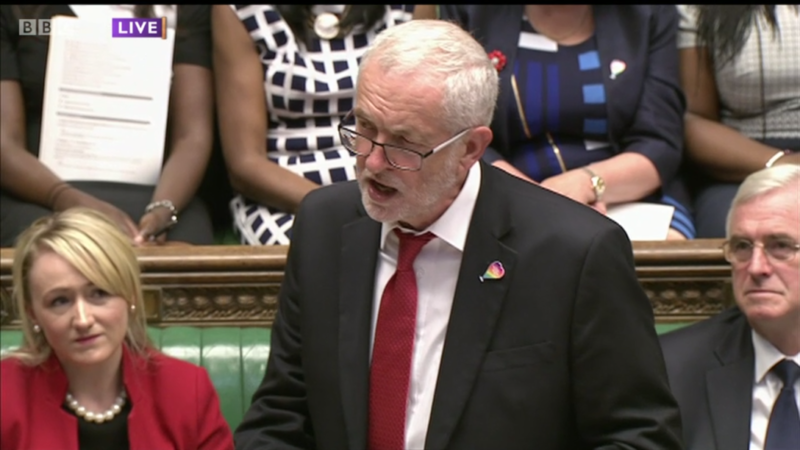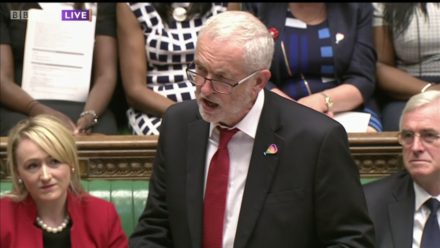

The lines felt familiar but it sounded like they were being delivered by the understudy.
Then I remembered that David Cameron is long gone – last seen in South Korea insulting British teachers and doctors – and Theresa May is, in fact, meant to be the PM.
Or, at least, the “interim prime minister”, as she was devastatingly dubbed by Labour fronbencher Kevin Brennan last month. Either way, she was emptily mouthing the slogans of her doomed predecessor at PMQs.
Jeremy Corbyn, meanwhile, sails on. And what a significant afternoon for a showdown with his interim opponent – the NHS marks its 69th birthday today but our hard-working staff won’t have many reasons to celebrate because of the measly one per cent public sector pay cap.
Corbyn picked up on this, of course and – after wishing everyone a “very happy pride month” – highlighted the outrage that so many people working in schools and hospitals face such hardship that they have been forced to use foodbanks.
Quoting a note from one teacher of 10 years’ experience, who has seen countless colleagues give up jobs schools, he said: “The public sector pay cap causes real shortages in nursing and teaching and many other professions and real hardship… What we are doing is recklessly exploiting the goodwill of public servants like David – they need a pay rise.”
So is the pay cap still in force? After all, it’s not like May to ever change her mind on an unpopular policy, is it?
For now, the Tories have retained the cap and – despite lots of public hints to the contrary – chancellor Philip Hammond has urged colleagues to “hold their nerve”. Indeed, what could be braver than denying a pay rise to a starving nurse?
Corbyn had a good line about a “rare moment of agreement between No 10 and No 11” as he went into a question about whether the pay ceiling will remain until 2020.
May said she understood why people “feel strongly about the issue of their pay”. Indeed – ask Dave Cameron on the speakers’ circuit in the Far East and George “six jobs” Osborne.
At this point it must have been tempting for Corbyn to reel out the jokes here but, perhaps wisely, he stuck to the serious subject matter, and pointed out the “net loss of 1,700” nurses and midwives from the struggling NHS last year.
“We have had seven years of tax cuts for the richest and tax breaks for the biggest corporations”, he bellowed, as the Commons chamber got increasingly rowdy.
Corbyn didn’t need any encouragement to speak up for teachers and NHS staff. He has been campaigning against spending cuts for years and he was one of many that millionaire Dave Cameron had in mind when he decided to stick the boot into “selfish” critics of this “so-called austerity”.
It was a desperate moment from Dave and one wonders if he got out of the wrong side of his luxury bed before deciding to lay into them.
The Tories he left behind in Westminster insist there is no money to pay public sector workers well enough to put food on the table but they did manage to find £1bn down the back of the Downing Street sofa as a bung for their new best friends in the DUP.
Corbyn picked up on May’s position on spending which was characterised first, by hypocrisy, and then confusion.
Where did the PM find the cash to splash to “keep her own job?”, Corbyn asked. But we know the answer to that one. The “magic money tree used” to grow outside the Labour leader’s office, according to some reports, but now it seems to have taken root in the Downing Street garden.
“I hope the prime minister is proud of her record of controlling public sector pay to the extent that hard-working nurses have to access foodbanks in order to survive”, Corbyn said, to cheers from his own side.
What a contrast to a year ago. Then Corbyn stumbled frequently stumbled, his supporters were silent and his critics simply groaned inwardly.
Now, Corbyn remains in opposition, but he has won more allies on his own side, stocked the green benches with MPs powered to Westminster – at least in part – by the Corbyn surge and quietened some of his strongest opponents, for now.
Corbyn looked confident while May lost her voice later on in a moment that recalled the nervous throat-clearing of Iain Duncan Smith during his time as Tory leader.
Today Corbyn didn’t exactly have a zinger on the indecency of May’s position on public sector pay but through sheer repetition and campaigning force he was able to pinpoint Tory failure on the “low pay epidemic”, the dire levels of nursing recruitment and faltering levels of home ownership.
“Except for more misery, what does the prime minister and her government actually offer for the young people of this country?”, he fumed. Quite right.




More from LabourList
Letters to the Editor – week ending 22 February 2026
‘The coastal towns where young people have been left behind by Whitehall’
‘How Labour is modernising transport in Wales with fairness at its heart’